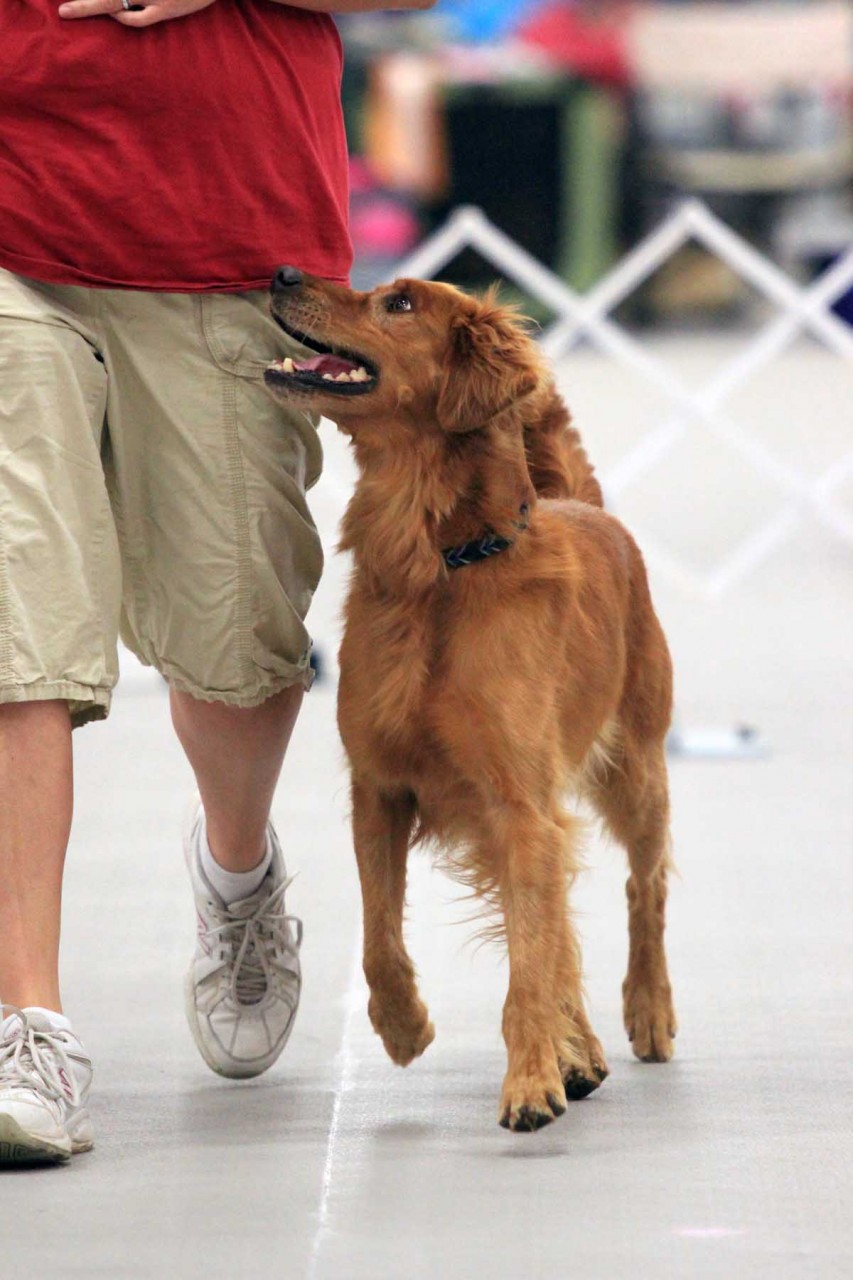Attitude and Precision - You Can Have Both!!
Is precision important to you in rally or obedience? It's true, most of us would like our dogs to be precise and accurate! Sometimes, however, the way we go about achieving that goal of precise behaviors can affect the dog's attitude. So how can we get both precise behaviors and happy dogs?
First, you want to do a good job defining criteria right from the beginning. Split up behaviors into such fine pieces that the dog is very likely to be correct. Use props or prompts to your advantage. Platforms, foot targets, touches, chin rests, gates, and more can be used to define to the dog exactly how to perform the behavior that you're asking for.
Raise criteria slowly, but ensure that your dog is still performing the behavior the way you want. For example, start using a front platform to set your dog up for that perfect straight front. I combine the front platform with a chin rest to keep my dog close. These are taught separately. When each skill is fluent, I put the two together. The front platform controls exactly where my dog is in relation to my body, and the chin rest ensures that he keeps his weight on the front and gets nice and close to me, tucking his butt into a sit.
When your dog is fluent combining those behaviors, raise criteria by changing your prop. Use gates or a PVC box. Teach your dog that even though the prop changes, the behavior is the same. Straight is still happening because your prop is creating it. Close is happening because of the chin rest.
You would then go through the process of raising criteria by fading the prop. There are lots of great ways to fade props in a way to keep the accuracy and criteria that you've taught. Take it slow and watch that your criteria isn't slipping. If it does, go back to the foundations.
When (and Why) Repetition Leads to Frustration
Repetition is really hard for many dogs. When you ask the dog to do the behavior over and over, the dog starts to think he is wrong and will often change the behavior to try something else. Then we get frustrated because the dog is going backward, and it all ends in a mess.
Some dogs handle repetition better than others, but I'm a big fan of not doing a ton of reps. If I get 2 or 3 brilliant reps (and sometimes even one, if it's been a struggle) I reward my dog and move on! I may come back to that behavior later in the session but I don't like to "drill" my dogs. I've definitely seen repetition cause the dog to lose attitude and precision.
Keeping Your Dog In the Game
Using your rewards wisely will help keep your dog's attitude happy and confident. If my dog does a behavior, but not to criteria, I will usually throw a reset treat and set up a scenario where the dog is more likely to be correct the second time. With trained dogs, I'll try the same exercise again without any modifications, but if I get two mistakes in a row I will break it down.
If my dog does a behavior that meets criteria, I will often mark and reward in position, then throw or give a reset treat to set up the next rep. I've found that a second reset treat will help the dog's enthusiasm while setting the dog up to repeat the behavior.
Keep your sessions short and fun! My training sessions are energetic and playful. I smoothly move from play to train to reward to play to train. I have my session roughly planned out so I'm not still and thinking about what to do next. I also keep my session short. How short depends on what I'm training and the dog, but I'd say most sessions are under 5 minutes.
If you need to think through something, or if your dog does something that you don't expect and you need to process, put your dog in a down stay, on a station, or in a crate.
Don't Leave Them Hanging...
In my experience, one quick way to affect your dog's attitude and confidence is to leave the dog hanging. If your dog makes a mistake and you just freeze, your dog will start to worry and wonder what's going on.
The obedience signals are a really good example. Say you give the down signal and your dog just stares at you. Waiting for the dog to move can be really hard on the dog. The dog may start to question himself and then get worried. Support your dog. Don't leave them hanging.
Improving Your Rally Scores
Training more precise behaviors will help your rally scores go up! If you're heeling is cleaner and your fronts and finishes are straight, you will lose fewer points. If you want to learn how to train precision plus a ton of other tips to get those scores up, check out the class I'm running in June, From Good to GREAT! Increasing Your Rally Scores!
When you're training your dog, be in the moment. Be present. Keep things short and fun. Train good criteria. Most importantly, have fun and your dog will too!
By accepting you will be accessing a service provided by a third-party external to https://www.fenzidogsportsacademy.com/
